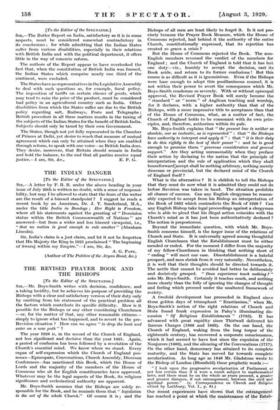[To the Editor of the SPECTATOR.]
Snt,—The Butler Report on India, satisfactory as it is in some respects, must be considered somewhat contradictory in its conclusions ; for while admitting that the Indian States suffer from various disabilities, especially in their relations with British India and with the political department, it offers little in the way of concrete reform.
The authors of the Report appear to have overlooked the fact that, when the constitution of British India was framed, the Indian States which comprise nearly one third of the continent, were excluded.
The States have no representatives in the Legislative Assembly to deal with such • questions as, for example, fiscal policy. The imposition of tariffs on certain classes of goods, which may tend to raise the price of the product, must be considered bad policy in an agricultural country such as India. Other disabilities from which the States suffer are due to the British policy regarding salt, Railways, Posts and Telegraphs ; British procedure in all these matters results in the taxing of the subjects of the Indian States for the benefit of British India. Subjects should only be taxed by their own Government.
The States, though not yet fully represented in the Chamber of Princes at Delhi, yet desire to reach that measure of mutual agreement which can only be attained when they are enabled through reform, to speak with one voice—as British India does. They desire, moreover, that Britain should remain in India and hold the balance, to the end that all parties receive equal


































 Previous page
Previous page